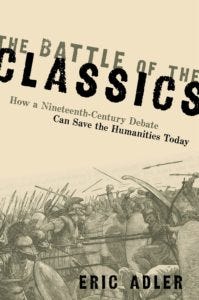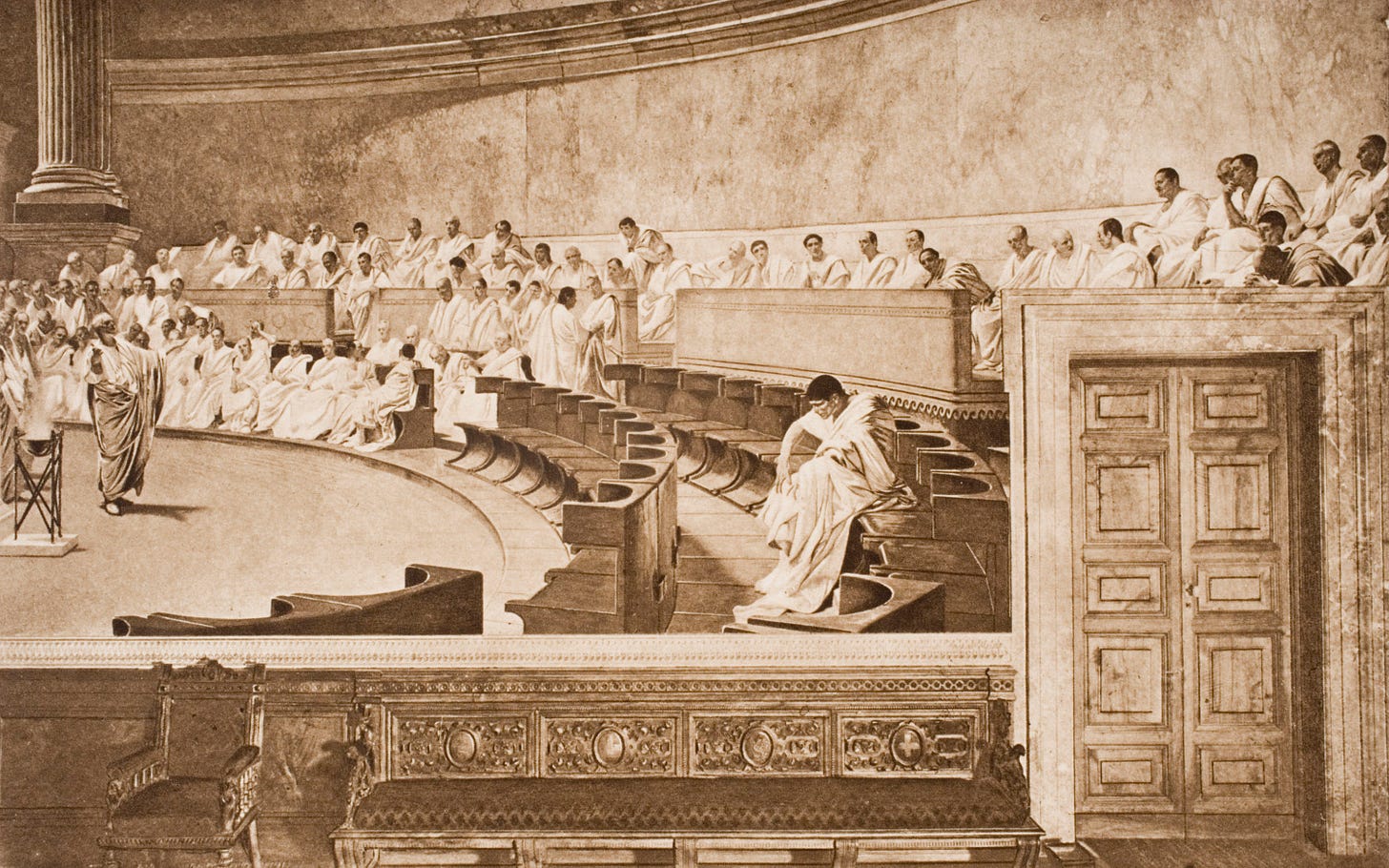What Are the Classics For?
Some on the left are turning against them. Some on the right are oversimplifying them. How should we think about—and learn from—great classical works of literature and philosophy?
Recent months have seen a resurgence of an old debate over the merits of studying the classics, and the humanities more broadly. The discussion is largely in response to an early February New York Times Magazine profile of Dan-el Padilla Peralta, an immigrant from the Dominican Republic who is now a professor of classics at Princeton University—and who believes that the classical tradition is inextricably bound with white supremacy and that his discipline, as presently constituted, may not deserve a future.
The debate has so far fallen along familiar political lines. This polarized response, however, has caused observers on both the left and right to miss important insights.
Those on the political left, such as Padilla, are correct that we must acknowledge the ways in which the legacy of the classics has been tainted—both the harmful ways in which they have been used across time, and the shortcomings of the people and cultures that produced them.
The Times Magazine profile, for example, discusses at length the ways in which classical tradition has been appropriated by activists on the far right, including individuals involved in the January 6 insurrection at the Capitol. Some of the insurrectionists donned Greek helmets with Donald Trump’s name emblazoned on them or carried flags inscribed with Molon labe—a phrase, attributed to Spartan King Leonidas when the Persian King Xerxes instructed him to surrender his weapons, meaning roughly “You come and take them.”
Yet the fact that a few extremists on the political right cherry-pick from the classics is no reason to dismantle them. As Donna Zuckerberg—a self-described “feminist-progressive” classicist who runs the now-defunct classics publication Eidolon (of which Padilla was on the editorial board) and wrote Not All Dead White Men, a book about alt-right classical reception—has explained, “No matter how white and male Classics once was, we are not that anymore. In spite of the numerous obstacles that remain, our field is now more diverse than ever, and that is something to be proud of.”
Donald Robertson, a cognitive behavioral therapist and author of How to Think Like a Roman Emperor, a popularization of the philosophy of Marcus Aurelius, has a similar view. He told me that he sees the popularity of the classics among the alt-right as an opportunity to spark the reappraisal of prejudiced beliefs. “It’s paradoxical,” he told me, but the fact that “the alt-right uses the classics allows me to get into dialogue with them, question their toxic beliefs, and show them how their views are not aligned with the philosophy and thinkers they claim to love.”
Calls to forsake the classics entirely are too quick to surrender powerful works of literature to people who are sure to use them for destructive ends. Such arguments not only miss an opportunity to persuade and educate, but also miss nuance. “The Classics” are simply not a monolithic collection of the works of white, powerful men. The works of the Greek female poet Sappho rival the epic poetry of Homer. The Stoic philosopher Epictetus was a slave. Plutarch, the Roman moralist, strongly advocated the education of women. Zeno of Citium was Phoenician and described as having “dark skin.”
Commentators on the political right have made many of these important points. Yet some of them are guilty of gross simplifications as well.
National Review’s Rich Lowry, for example, wrote for the New York Post,
Western thought and literature have proceeded throughout their history in dialogue with the classics, constantly interacting with the arguments, themes and characters of those long-ago forebears.
This isn’t true of other ancient societies. . . .
A key difference between the Greeks and Romans and the rest was that their writers critiqued and lampooned their own societies. This willingness to engage in self-criticism became one of the hallmarks, and strengths, of Western culture. Has Lowry read every other culture’s literature to be able to claim that the West’s is uniquely self-critical? Probably not. Such unsupported, Western-centric generalizations are far too common in defenses of the classics.
Eric Adler’s The Battle of the Classics, published in September, offers a stronger—and much more intellectually ecumenical—argument for the classics. Adler, a classics professor at the University of Maryland, wrote his book after observing the failures of modern justifications for studying the humanities. Too often, he notes, these defenses are “skills-based” and appeal to the “mental discipline” produced by studying classical languages, offering bland claims that studying the Great Books fosters “critical thinking.”
Adler considers these occupational arguments, as well as the many ethnocentric ones, too shallow. The contraction of humanities offerings on college campuses across America underscores just how weak these arguments are.

Adler instead finds his champion in the “New Humanism” of Irving Babbitt (1865-1933), a Harvard professor who advocated a return to an older tradition of studying the classics—a tradition that looks to these great works for moral instruction, as well as for the basis of a core curriculum that draws from literature across cultures. Babbitt—who studied Greek and Latin alongside Sanskrit and Pali—saw little value in studying classical languages for their own sake. He anchored his humanism in the studia humanitatis, which exposes students to great works of literature—in the original languages—with the goal of cultivating students’ wisdom and forming their character.
Intellectually omnivorous, Babbitt also advocated opening up the Great Books core to Eastern authors. He argued that there existed, as Adler puts it, a “wisdom of all the ages: a core of common human experience gleaned from cultural masterworks that can inform students about the human condition in all its diversity and encourage them to ponder sound ethical standards.”
Babbitt rejected claims of Western racial, cultural, scientific, or religious superiority. His enthusiasm for teaching Eastern texts stood as an implicit rebuke to his era’s social Darwinism, which attempted to categorize humanity along the lines of a pseudoscientific hierarchy of races. Babbitt saw education as a means of softening the rougher edges of the human personality, as a way to give students psychological tools—and the motivation—to resist our impulse to divide ourselves and to dominate other humans.

Irving Babbitt (1865-1933)
Adler explains how Babbitt believed that great works of literature—from Western and Eastern cultures alike—could offer students a vision of beauty, goodness, and truth. Such works stimulate reflection on the unchanging questions of the human condition: Who are we? Why are we here? What is our position in the universe? How should we think about living well and wisely together? Babbitt favored well-roundedness over specialization, soulcraft over technical skill.
Adler argues that Babbitt’s “opening up” of the core pedagogical texts was a transformation of humanism similar to Cicero’s transformation of Greek paideia. The ancient Greeks had focused their education solely on their own culture’s literary classics, but the Romans, following Cicero, were convinced of the importance of studying cultures in addition to their own. There are excellent reasons for democracies such as our own to teach the texts that contributed to our own ideals and existence, but as all human traditions have contributed to the “wisdom of the ages,” exploring different manifestations of the human experience can help us better determine the best way to live.
This is a lesson we could stand to learn today. We should remember that no person or creation is impervious to improvement. Quoting Babbitt, Adler invites us to reinvigorate classical education to meet our present needs today: “The task of assimilating what is best in the past and present, and adapting it to one’s own use and the use of others, so far from lacking in originality, calls for something akin to creation.”


